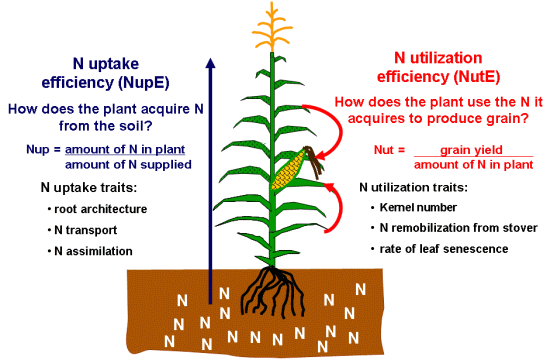What are NitroGenes?
 Grain yields of maize and other cereal crops increase dramatically when provided additional nitrogen (N). As a
result, nearly five million tons of N fertilizer are applied annually to the maize crop worldwide. This fertilizer use
not only increases crop input costs, but also negatively impacts the environment and raises the energy
requirements for crop production. Low N soils and lack of access to N fertilizer also limit grain yields in
developing countries. Though it is known that maize varieties differ in their nitrogen use efficiency (NUE, see
below), little is known about the genes that control maize responses to N. This lack of knowledge has hindered
improvement of maize NUE.
Grain yields of maize and other cereal crops increase dramatically when provided additional nitrogen (N). As a
result, nearly five million tons of N fertilizer are applied annually to the maize crop worldwide. This fertilizer use
not only increases crop input costs, but also negatively impacts the environment and raises the energy
requirements for crop production. Low N soils and lack of access to N fertilizer also limit grain yields in
developing countries. Though it is known that maize varieties differ in their nitrogen use efficiency (NUE, see
below), little is known about the genes that control maize responses to N. This lack of knowledge has hindered
improvement of maize NUE.
The National Science Foundation (NSF) Plant Genome Research Program has sponsored this project to apply recent advances in plant genomics to discover maize genes that are associated with maize NUE, which we have named "NitroGenes". The information learned about these "NitroGenes" will provide new opportunities for improving NUE in maize and other crops through breeding or biotechnology approaches.
What's New?
- Amino acid profiles of earshoots from IBMRI x IHP1 mapping population.
- Employment opportunities
- "Sugarcorn", corn without grain that needs less N and accumulates high amounts of sugar
- If Corn Is Biofuels King, U Of I Research Shows Tropical Maize May Be Emperor


